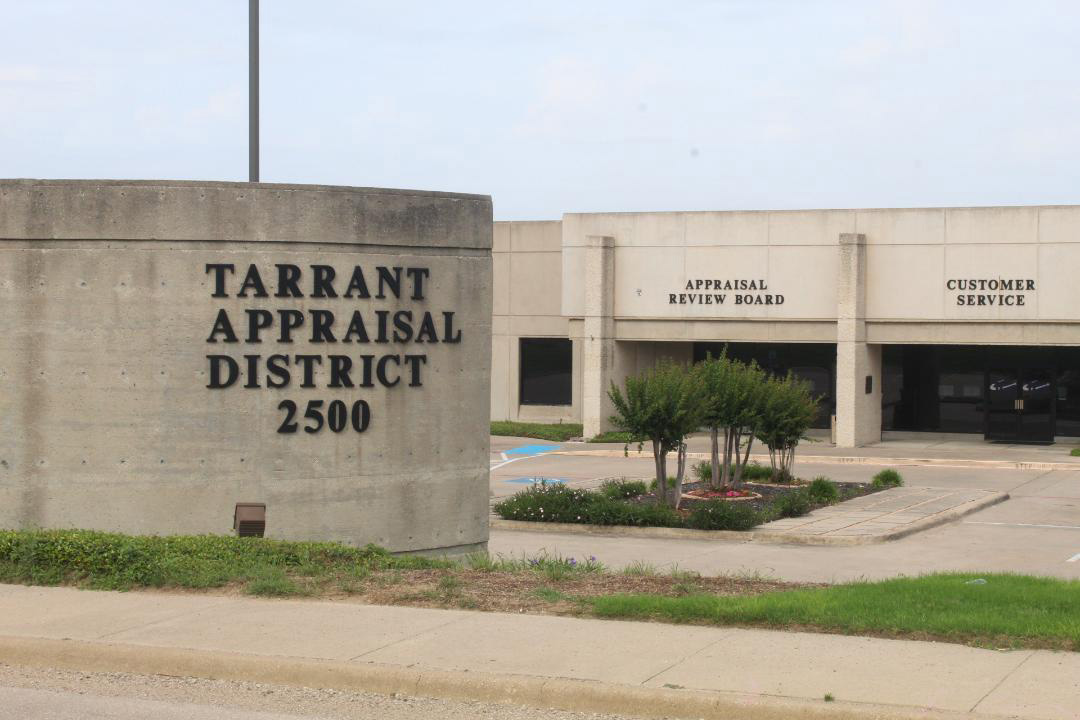Signs that read, “County Maintenance Begins” are typically met with dreaded anticipation of potholes and uneven pavement — but not on one stretch of unincorporated road in northwest Tarrant County.
The pristine asphalt that runs parallel to Jacksboro Highway is freshly painted and bordered by carefully manicured gravel shoulders that make for smooth driving. This picturesque stretch of Nine Mile Azle Road appears lightly used. On a recent weekday afternoon, half an hour elapsed before a single driver appeared.
According to a project report that we obtained from the county, the repaving of Nine Mile Azle Road, which was completed in August, cost taxpayers $377,520.87.
One longtime Tarrant County employee we are calling James to protect his privacy told us the proximity of the road to a sand and gravel company is no coincidence. One family with close ties to the gravel company are longtime political donors to County Commissioner J.D. Johnson, whose Precinct 4 encompasses much of west and northwest Tarrant County. The sand and gravel company contracted with the county in 2009 and 2010 to provide topsoil for county projects, a county spokesperson told us.
Between 1998 and 2010 (the scope of our research), members of that family donated $14,589 to Johnson’s campaign. The high cost of the recent road resurfacing likely meant that other projects not tied to campaign contributions were likely delayed, according to the county employee. We reached out to the company, and a part-owner declined to comment. Johnson did not reply to our requests for comment on the matter or anything else we cover in this story.
“If you know J.D. Johnson,” James told us, “you have easy access to whatever you need.”
Fort Worth trial attorney Steve Maxwell described the local good ol’ boy club that has controlled local politics for decades.
“When I first came to Fort Worth fresh out of law school, it didn’t take long for me to figure out that the old axiom ‘It’s not what you know, it’s who you know’ was an important fact of life,” he told us. “In Fort Worth, a relatively small group of judges and large law firms wielded a great deal of power at the courthouse. It was a poorly kept secret that hopes for a political career required the blessing of a small group of influential businessmen and attorneys known as the 7th Street Gang.”
In recent months, our news magazine has received a swell of tips and requests to investigate Tarrant County’s good ol’ boy network. Many of the confidential sources are current and former employees and even one former elected official. The sources voice frustration about county leaders who allegedly abuse their positions for personal gain or to retaliate against perceived political opponents.
Tarrant’s good ol’ boy club has seldom grabbed headlines, let alone national attention, but a slew of recent missteps on the part of county leadership has invited federal lawsuits and investigations and undermined the credibility of local leaders who once ruled Texas’ third most populous county with impunity.
The recent ending of DA Sharen Wilson’s political career may be closely tied to a new federal investigation that is looking into potential civil rights violations at Carroll school district, which serves Southlake. Earlier this year, Wilson pushed for the Class B Misdemeanor indictments of two Carroll school board members who were taking steps to combat the very civil rights abuses that the federal government is now investigating. The DA’s unprecedented prosecutions served the political aims of current county judge candidate Tim O’Hare, who maintains a powerful network of Republican donors who see tarnishing Carroll school district’s image as preferable to addressing lingering racism in the affluent and predominantly white suburb in northeast Tarrant County.
At Tarrant County’s commissioners court, the U.S. Department of Justice may soon come knocking. Plaintiffs in a local redistricting lawsuit filed by Maxwell recently contacted the DOJ to request that the expansive federal effort include examination of alleged gerrymandering in Tarrant County. On Nov. 9 and against the vocal opposition of several ethnic minority elected officials, Tarrant’s three Republican commissioners adopted a precinct map for justices of the peace and constables which, according to the county’s own attorney, dilutes minority representation in at least one of the eight precincts. The new map also eliminates political opponents for two incumbent Republican JPs ahead of 2022’s elections.

Courtesy of Tarrant County
Misuse of power on the part of Tarrant County elected officials has become so brazen that the Texas legislature recently passed a law that bars governmental groups that rely on property tax revenue from abusing their votes when electing board members to the appraisal boards that determine the value of taxable properties.
House Bill 988, which was conceived by local Realtor Chandler Crouch, ends local commissioners’ practice of placing their preferred board members at the head of the Tarrant Appraisal District (TAD), the local governmental group that appraises residential and commercial property values and awards property tax exemptions. Although TAD sets values that result in those pesky property tax bills, the board of TAD is not elected by citizens but rather by the elected officials of cities, the county, and the local school districts (i.e., “taxing entities”).
Four years ago, County Administrator G.K. Maenius said during a commissioners court meeting that the commissioners’ votes should be delayed so the five commissioners could swing the final tally toward candidates of the court’s choosing.
Crouch told us that larger taxing entities like the City of Fort Worth and Tarrant County have an unfair advantage over smaller municipalities and school districts because the commissioners court and Fort Worth City Council have greater voting power, and they have traditionally delayed their votes until they’ve seen how smaller government groups are voting.
The new bill requires any group that is allotted 5% of the overall vote every two years to vote early for TAD’s board elections, meaning any reasonably large entity like the City of Fort Worth or the Fort Worth school district.
“The larger entities have the luxury to wait right until the voting ends,” Crouch said. “They all talk, and they figure out how they need to divide their votes, so they cancel the votes from the smaller entities and then pick who they want. That’s dirty to me. Now it is illegal.”
As Tarrant County skews increasingly younger and more diverse, you might think that the good ol’ boy network’s days were numbered. Compared to Fort Worth’s new, youngish city council, Tarrant County’s leadership is much older, whiter, and decidedly more stuck in the past.
And yet former Mayor Betsy Price is widely expected to replace longtime County Judge Glen Whitley next November, and J.D. Johnson’s son, Jody Johnson, will run against fellow Republican Manny Ramirez for commissioner in the March Republican primary. Tarrant County’s good ol’ boy club — and the seemingly endless acts of insider dealings that Fort Worth’s daily paper avoids reporting on — appears poised to survive 2022’s elections largely unscathed.
Nepotism and Insider Dealings
The new JP/constables precinct map would never have passed without insider dealings on the part of Tarrant County’s three Republican commissioners, Maxwell said. The outcome of the Nov. 9 meeting was a forgone conclusion because, according to Maxwell, the five JPs had already schemed with the three commissioners to adopt the map ahead of the meeting. Those types of allegations are apparently a hallmark of government dealings in Tarrant County.
The direct line one powerful law firm enjoys with a county commissioner is widely known and accepted by county leaders. Precinct 3 Commissioner Gary Fickes was elected in 2007, three years before Linebarger, Goggan, Blair, and Sampson hired his son, Cory Fickes. The national law firm that specializes in collecting delinquent property taxes has a reputation for meddling in elections for self-serving purposes. Last December, Linebarger lawyers unsuccessfully tried to circumvent TAD’s vendor bidding program to gain a contract that was potentially worth millions (“ Keeping Tabs on TAD,” Jan. 6).
In 2016, Tarrant County’s commissioners renewed Linebarger’s contract to collect delinquent taxes. Fickes abstained from the vote. According to county documents we reviewed, Linebarger earned $365,417.96 between 2015 and 2020 for services rendered to the county.
That family connection pales in comparison to the nepotistic culture at TAD that has been codified as A-OK since 2010, thanks to the appraisal district’s top staffer, Jeff Law.
Earlier this year, a TAD whistleblower documented attempts to cover up software problems that led to overbilling of area property owners (“ Shining a Light on Tad,” June 2). The whistleblower also described a hostile work environment where retaliation was a constant threat to employees who spoke up to or against TAD leadership. Missing from our coverage was a follow-up document filed in 2018 by the same whistleblower or whistleblowers. The 11-page letter includes an entire page on nepotism at TAD.
Understanding how rampant nepotism could persist at TAD requires a review of TAD’s employment procedures. In 1987, TAD’s policy on nepotism was clear.
“Relatives of any member of the board of directors or of the chief appraiser or any other employee of the district shall not be appointed to, or hired for, any position or other service of” TAD, the hiring policy guidelines read at the time.
In short, nepotism was not allowed. No exceptions. In 2008, chief appraiser Law was hired in direct violation of rules forbidding nepotistic hiring practices. His first cousin, David Law, was already the longtime head of commercial appraisals. The vote meant that TAD’s board at the time ignored its own hiring guidelines by violating standing rules that barred self-interested hiring. Two years later, TAD’s board revised the hiring guidelines to include language that allowed for the type of familial hiring practices that brought TAD’s chief appraiser on board.
Critics of TAD misdealings allege that instances of pulling favors for friends and families undermine the credibility of the government group that sets rates for soaring property tax bills.
“When an individual submits an application for employment and it is determined that a prohibited relationship would exist if the applicant is hired, an evaluation will be made to determine if the applicant should or can be hired and if the relationship would create a burden or hardship on TAD or its employees,” the 2010 policy reads. “This determination is within the sole discretion of the chief appraiser.”

Photo by Edward Brown
TAD’s 2021 personnel policy includes the same language that gives Jeff Law unilateral authority to permit relatives to be hired to any position within TAD. The whistleblower document alleges that numerous TAD employees have direct connections to the church that Jeff Craig attends, his alma mater Abilene Christian University, and his adopted home of Arlington. The whistleblower alleges that job postings are not always made public as required by law.
“TAD’s employment tactics violate the public trust, discriminate against minorities, and defy public expectations that everyone has an equal opportunity to employment within the government,” the whistleblower wrote.
Our review of TAD’s current 204 employees found that at least 30 current or recent employees could be considered immediate family members. The relations include spouses, siblings, parents/children, and first cousins.
Tarrant’s good ol’ boy club is also alive and well at the Tarrant Regional Water District (TRWD), where longstanding nepotism, hush money, and shady dealings have been the norm for decades. The five-member board that oversees local flood control, water reuse, and the $1.2 billion Panther Island development recently voted to award outgoing general manager Jim Oliver a $161,674 settlement.
This goes back to June, when TRWD’s recently elected board voted to cancel a previously promised bonus of just over $300,000 for Oliver. The general manager lawyered up, and the recent settlement allows TRWD to avoid being sued by Oliver over canceling his golden parachute. Only board member Mary Kelleher voted against the recent settlement.
After decades of reported lavish spending at taxpayers’ expense, TRWD appears to be rolling back on blatant nepotistic hiring practices even as J.D. Granger, son of U.S. Rep. Kay Granger, who founded the Panther Island project around 20 years ago, remains on TRWD’s payroll to the tune of $242,000 per year. Two years ago, J.D. stepped down as head of the Panther Island project amid outcry over his ties to his mother and the powerbase that continues to push for the Northside development. More recently, J.D.’s wife resigned from TRWD, possibly due to fallout over the DA’s opportunistic investigation.
Recent reporting by Fort Worth Report found that, last year, then-general manager Oliver hired his girlfriend, Valerie Jay, without advertising the opening. Oliver pushed back on the allegations of nepotism when he told the Report that it was another TRWD employee who hired Jay. TRWD’s current board appears to be finally addressing a culture at TRWD that has historically viewed the taxpayer as a meal ticket.
The October announcement of a grand jury investigation into TRWD dealings was yet another reminder of how Tarrant County’s district attorney office has recently used the threat of criminal charges to push its political agenda (“ Red Flags,” Oct. 20). The high-profile announcement came just weeks before county voters weighed in on Prop B, which would have given DA Wilson $160 million for new “construction, improvement, and equipment.” Roughly 55% of the 100,000-plus ballots cast rejected the proposition — possible political blowback for the increasingly partisan district attorney’s office.
Police unions are also fine with pulling and asking favors. Fort Worth’s Police Officers’ Association (FWPOA), typically known for trying to sway city elections, is already playing a role in Precinct 4’s commissioner race. The police union heavily backed Mayor Mattie Parker, and she and other elected officials who partly owe their political careers to police union donations are now getting behind Ramirez, who heads the union. The quid pro quo makes suspect any political endorsement from candidates with ties to police union donations.
Constable Johnson is by no means guaranteed to inherit Precinct 4 from his father, but a recent down payment (courtesy of his father) helps his chances. On July 21, J.D. donated $250,000 of $252,873 from his remaining war chest to Jody. Retiring elected officials typically donate their funds to a charity or a local branch of their national party. Jody has pledged to use the funds solely for campaigning purposes and to not let his campaign interfere with his constable duties as he seeks the commissioner position that pays $188,000 a year.
Can You Pull Me a Favor, Commish?
Asking commissioners for favors — as five current JPs allegedly did when seeking preapproval of the new JP/constables precinct map — appears to be a time-honored tradition in Tarrant County. In late 2017, a current county commissioner asked a high-ranking county official to “fix” several tickets for his friends. We are concealing the official’s true name to protect the whistleblower from retaliation.
“It is not only unethical,” whistleblower Robert said, “but, with the new computer systems, it was virtually impossible. In the past, a judge could ‘lose’ a ticket once it arrived in [the judge’s] office. The officers would bring the paper copies of the tickets to the court every few days. All ticket dispositions are reported to the state every month. If you get a ticket, you have three options: Plead guilty and pay the fine, plead nolo [no contest] and throw yourself at the mercy of the court, or plead not guilty.”
The new computerized system meant that tickets could no longer become “lost” in transit to a judge. Judges, Robert continued, are bound by a different set of ethics than commissioners.
“I refused, politely explaining to [the commissioner] that I ethically or physically could not ‘fix’ or ‘lose’ tickets for his drinking buddies,” Robert told us. “That pissed him off.”
Doing favors for friends remains a spoil of entering public office in Tarrant County. James, the whistleblower who told us about Nine Mile Azle Road, said that personal connections with county commissioners can lead to the free use of county construction equipment, access to free prisoner labor, and other spoils.
When the county tears up old roads, he told us, workers use a big machine that chews up the asphalt that needs to be hauled somewhere. The county cannot sell it, though many individuals and companies can find a use for it. Anyone can request access to a “big stockpile” for chewed up asphalt in Precinct 4.
“J.D. gives it away to preferred people,” James alleges. “If you know J.D., you can get spoils out the wazoo.”
J.D. Johnson allegedly “gifted” Saginaw school district an entire building that was built using Precinct 4 resources and equipment, the longtime employee claims. Before Johnson became county commissioner, he was mayor of Saginaw, which the longtime employee believes may have been one motivating factor for the gift.
“The school district got that building,” James alleges. “Cement and rebar were used at county expense. Inmate labor was used and very expensive machinery.”
The confidential source said he didn’t have a problem helping a public school district, but the secretive manner of the construction bothered him.
“To me, it just wasn’t right,” he said.
Maxwell’s recent lawsuit isn’t the first time litigation has been used to push back on Tarrant County’s good ol’ boy club, Robert told us. In 2012, Phil Guiles, who used to own a bail bond company, sued the Tarrant County Bail Bond Board (BBB), a regulatory agency. Robert said J.D. Johnson and other county insiders who sat on the board had a history of making backdoor deals with Johnson’s friends. When defendants failed to show for court, bondsmen were usually on the hook for their client’s bond (a form of collateral), but Johnson’s friends were given substantial breaks when it came time to pony up, the unsuccessful lawsuit alleged.
Guiles, however, was right, Robert said.
Members of the board “would congregate in J.D.’s office,” Robert alleges. “If the meeting went into a private session among the BBB members, things would be said that referred back to the good ol’ boys’ private meeting.”
Even the DA’s office isn’t above doing favors for folks who have personal connections to DA Wilson, especially if the potential scofflaw in question is related to a commissioner. In September, a DA spokesperson vouched for Constable Johnson’s decision to remain in office while campaigning for commissioner. Texas politicians are prohibited from retaining public office while seeking higher office under the state constitution’s “Resign and Run” article. The law is intended to prevent elected officials from abusing their position when seeking higher office and to afford taxpayers the full attention of the men and women they elect into office. According to a DA spokesperson, Jody has somehow resigned from office while remaining in office.
“If Constable Johnson still has more than one year and 30 days left on his term when he announces candidacy for another office (which he does), he has automatically vacated the office according to the Texas Constitution, Article 16-Section 65,” the spokesperson said in an email that we acquired through an open records request. “A constable who vacates his office automatically by becoming a candidate would, nevertheless, hold over until the commissioners court appoints a new Constable. If the Court chooses not to appoint someone, he would continue to holdover until the next election.”
In short, as long as the commissioners court does not replace Jody, he may remain in office. We reached out to local attorney Jason Smith for perspective on Jody’s decision to remain in office, and Smith told us in an email that the state constitution is clear, despite what the local DA and commissioners would like to think.
Former city councilmember Wendy Davis faced a lawsuit in 2009 for failing to resign from her office before campaigning for state senator. When Davis’ Republican opponent Kim Brimer noticed that Davis remained in her office after announcing her senate bid, Brimer sued and was almost successful in knocking Davis out of the race for violations of the state constitution. Davis was able to skirt breaking a constitutional law due to a technicality. The deadline for removing a candidate had passed, a civil court ruling found.
Criminal Injustice
Few are under any illusion that Tarrant County’s DA, under its current leadership, will investigate new violations of the Texas Open Meetings Act (TOMA), which requires elected officials to discuss matters of public interest in open forums and not privately. Lawyer Maxwell has requested documentation that may prove that three commissioners violated that act — a potential Class B Misdemeanor charge in the state of Texas — while planning and drafting the new JP/constables map.
Good ol’ boy clubs, or institutional versions of them, abound throughout Tarrant County’s cities and towns. Protecting offending officers from accountability is the job of Fort Worth police department’s Office of Internal Affairs (OIA). While beat cops are tasked with arresting and jailing citizens who commit crimes, the OIA protects high-ranking officers who commit similar offenses from being disciplined through the use of internal investigations that the public and the media are not privy to.
Former deputy chief Michael Shedd, according to one whistleblower and city documents, sexually harassed a female colleague earlier this year. Shedd was allowed to retire shortly after the OIA “investigated” his actions. The high-ranking officer would have quietly escaped public scrutiny were it not for the actions of the whistleblower and our investigations that exposed the systems that allow powerful officers to skirt any form of accountability.
One of the few systems for investigating potential criminal actions of public officials and county prosecutors is through the use of special prosecutors. In Tarrant County, those independent investigations have a history of protecting vested interests. In early 2017, a special prosecutor said it was OK that DA Wilson used her office to fundraise for her reelection campaign, though the Texas Penal Code forbids public servants from using their positions for fundraising purposes. Appointments of special prosecutors in Tarrant County are on the rise — 2016 (two), 2017 (three), 2018 (six), 2019 (five), and 2020 (seven) — and yet there have been no known instances when the taxpayer-funded investigations resulted in the prosecution of a public official.
Keith Lane, former Haltom City chief of police, tried and failed to hold officials in that city accountable for violations of the TOMA. Local defense attorney Miles Brissette, an active member of Tarrant County’s BBB, was one of two special prosecutors assigned by DA Wilson to look into the documented violations of TOMA. To this day, Lane has not heard one word about the investigation. Special prosecutors, Lane told us earlier this year, are just another part of Tarrant County’s good ol’ boy system (“ The Untouchables,” Jan. 6).
Daniel “Joe” Bennett recently requested that the local DA investigate TOMA violations at White Settlement school district, also based on vast documentation that he collected. Bennett’s concerns were dismissed. The documented instances of TOMA violations that were effectively ignored by the DA stand in stark contrast to two recent indictments of two Carroll school board members for violations of TOMA.
Following the Southlake indictments, a DA spokesperson told two NBC News reporters that TOMA “embodies the most basic values of Democracy. Its requirements ensure the citizens of Texas can stay informed about and participate in their local government.”
The lofty language belied the political nature of the indictments that furthered the political aims of a powerful PAC, Southlake Families, and its wealthy and well-connected founders that include current county judge candidate O’Hare. The Southlake Families donors are using the PAC and the indictments to ideologically align Carroll’s school board with bogus misrepresentations of Critical Race Theory (CRT), the academic framework that explores how racism shapes modern life in America. CRT has been falsely described as a leftist tool for forcing white students to feel guilty about America’s racist past.
The federal government has opened an investigation into potential civil rights violations of Southlake students following the right-wing takeover of Carroll’s school board. Whether the investigation by the Office of Civil Rights expands to explore the DA’s malicious prosecutions of the indicted Carroll school board members remains to be seen.

Photo by Edward Brown
Death Throes
The consensus among local activists and former government officials we spoke with is that Tarrant County’s good ol’ boy club is fracturing and diminishing.
“I have seen a lot of changes in Fort Worth and Tarrant County in the 45-plus years I have practiced law here,” Maxwell said. “The bar and our judiciary are far more diverse today than it was when I started. In 1976, there were no minority judges, and there was only one woman on the bench. The Tarrant County Bar Association did not elect its first minority president until 1996. The inclusion of women and minorities has added immensely to the stature and influence of our Tarrant County legal system.”
But that does not mean that the good ol’ boy way of doing business is over, he continued.
“While the new generation of local business leaders is far more inclusive than the business leaders of the 1970s, the old way of doing business still persists to a large extent — especially in politics,” Maxwell said. “Many people believe that shortcuts undertaken by those who consider themselves the best informed and most efficient decision-makers are in the best interest of the citizens of Tarrant County. I, however, applaud the efforts of the whistleblowers and community activists who are filing open records requests and digging deep into the activities of boards and committees whose activities have long escaped the unfettered scrutiny of the public. Democracy demands nothing less of us.”
This article has been updated to correct a reference to Jeff Craig.












Well that’s depressing. I guess the voters won’t do anything to stop it. Sad.